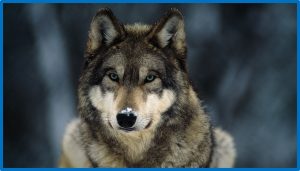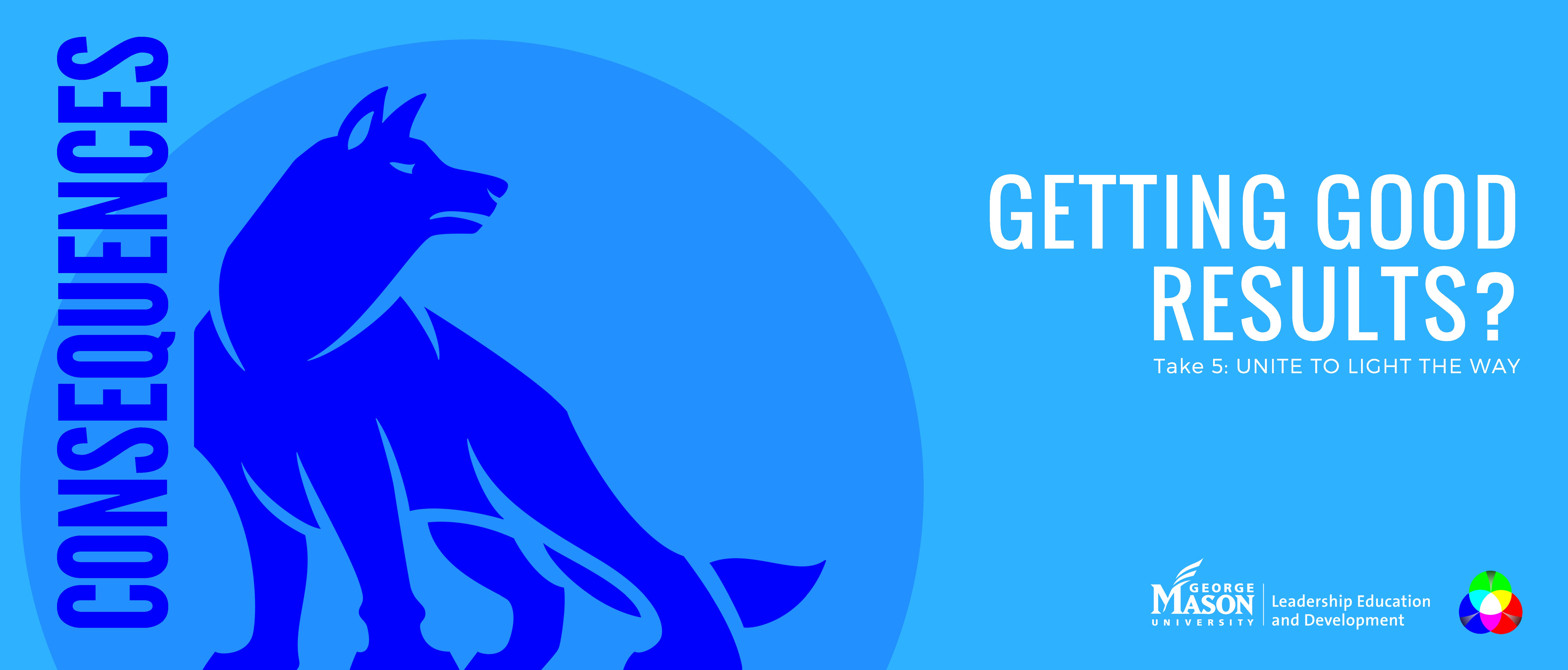

WHITLEY the WOLF. Focus Color: BLUE
Why read the information below?
1. Have a tough decision to make? Explore the strengths and challenges of this decision-making focus.
2. Discover the benefits of uniting different focus areas (colors/animals).
3. Practically apply these resources to make better decisions individually, and in groups. For example: use the FREE Take5 card (take5.gmu.edu/ethics-card), request a workshop (email: [email protected]), etc.
Why a Wolf?
Whitley, like many wolves, is known for being dedicated to what’s best for the larger group (or pack), as well as being adaptable to changing circumstances. Whitley and people who prefer the Consequences Focus go even further than the average wolf in order to consider the impact of their actions on society as a whole. They calculate how to adjust their actions in order to create the best results for the greatest number. They do not just consider the impact on themselves or their pack/group.
Why the color Blue?
Blue is one of the 3 primary colors of light, just as the Consequences focus is typically seen as one of the 3 primary ethical focus areas of Moral Philosophy. Imagine that we have three flashlights that we shine in a dark room. Each one shines a different primary color of light (green, red and blue). If we overlap these three primary colors of light we get white light, which is the full spectrum of visible light. Using visible light as a metaphor, we can combine the three primary ethical focus areas (Green for “Character“, Red for “Code“, Blue for “Consequences“) in much the same way that we combine visible light. By combining the three primary ethical focus areas (i.e., three primary colors) we can benefit from the strengths of different focus areas while balancing out the weaknesses of any single focus area.
Main Consideration:
When deciding what’s right Whitley and others with a Consequences Focus tend to focus their attention on getting good results, or CONSEQUENCES, that benefit as many as possible, as opposed to focusing on personal characteristics or consistent principles (e.g., rules/codes) that should apply across situations.
Question:
Like Whitley, someone with a Consequences Focus may ask themselves: “What will bring the best results and least harm for the greatest number of those affected?” They believe in the importance of calculating the impact BEYOND themselves and their pack (or “in-group”).
Strengths of the Consequences Focus:
1. CONSEQUENCES MATTER. Consider this story shared by a friend: “I was in Bolivia volunteering with an orphanage and became really close to a small boy named Miguel. We volunteered there for about 4 days and on the last day I went to leave. He attached himself to my leg and started bawling. I just remember feeling so awful and that what I was doing was really mean [even though my intent was good]. Here was this boy who had been abandoned by his family and then we volunteers come in for just a few days, pour out all this love and then leave them like so many others. It just contributes, in my opinion, to a feeling of being abandoned.” This example helps us to see that it is essential to consider the consequences of our actions, not just our intent to help. The Wolf’s Consequences focus helps us to consider the overall impact of our actions on the greatest number, not just sticking to consistent codes of conduct, or just focusing on personal characteristics.
2. IMPARTIALITY. Imagine that you have the opportunity to help choose someone for an important job at your organization. Your good friend really wants the job. This friend has been having a really difficult year and they are a very kind person. You really want to help them. However, you know that another person is more qualified and would do a better job, which would create better overall consequences for all. Your focus on the overall results/consequences leads you to advocate for the more qualified person, instead of your good friend. A strength of the consequences focus is that it can help us to consider the overall results (both short- and long-term) of our actions on the greatest number. This goes beyond just helping those with whom we have close relationships (Note: other focus areas may see this as a challenge, not a strength). Other decision-making approaches might lead us to only focus on being compassionate towards our friend, or treating our friend in the way that we/they would like to be treated in this situation (e.g., Bear’s Care focus).
Challenges of the Consequences Focus:
1. RIGHTS VIOLATIONS (or “tyranny of the majority”). Imagine that a medical research organization needs volunteers to be a part of a series of tests to help find a cure for a terrible virus. They need to act quickly, but they can’t find enough volunteers because of the possible risks involved. The researchers begin to perform the tests on some orphans against the orphans’ will because they say “it will only hurt this group of orphans, but it will save millions of other people… it’s for the greater good.” Even if this could save many lives, isn’t this a violation of the rights of those individuals? If we only think “What will bring the best results and least harm for the greatest number of those affected?” we could violate the rights of individuals and smaller groups (e.g., those in the minority).
2. MORE THAN CONSEQUENCES. Imagine that you get really sick and have to go to the hospital. Your friend Whitley is able to safely visit you at the hospital. You are so happy to see Whitley and you ask “Why did you come to visit me?” Whitley strictly sees things from a Consequences focus and says: “I asked myself ‘What can I do today that will bring the best results and least harm for the greatest number of people?’ and I determined that visiting you would be the right thing to do.” This seems very different to you than what your friend Olly said when visiting: “I’m here because you are my friend and I really like and care about you, of course I want to visit when you’re sick” (e.g., feelings of compassion). Whitley’s motivation seems a bit more calculated than Olly’s. Olly’s motivation seems to include more of an emotional connection: friendship, love, compassion. It can be argued that living an ethical life involves more than consequences alone. It could help Whitley to focus on the type of person they want to be (Otter’s Character), not just on the consequences that everyone should logically follow.
3. SPECULATION. Imagine that you and your friends advocate for more parking lots where you work or study (e.g., on a college campus). You believe this will help everyone get to class, work, etc. faster. You are successful in convincing people to build more parking lots. However, you did not realize that parking fees would go up, there would be less space for classrooms and/or offices and less green space, resulting in worse overall consequences. Sometimes our speculation about future consequences can be very wrong. (Note: this is an implementation problem of the Consequences focus). In this situation it would likely help to consult with those with a different focus area (e.g. Otter’s Character, Hawk’s Code).
Theoretical Background:
Consequentialist Ethics and Utilitarianism (based on the wisdom of philosophers such as John Stuart Mill and Jeremy Bentham).
Conclusion:
Whitley the Wolf represents a very important and respected focus area (CONSEQUENCES) from moral philosophy. However, it does not include everything. To balance out the challenges above, Wolf’s CONSEQUENCES should be combined with other focus areas like Otter’s CHARACTER, Hawk’s CODE, and Bear’s CARE. Combining focus areas is called PLURALISM and can be very beneficial.
Next Steps:
1. Remind yourself of the strengths and challenges of your main focus animal/color. This can help you anticipate benefits and identify potential problems down the road. For example, if you only focus on the Golden Rule (Bear’s Care focus: yellow/gold), you may not hold someone accountable for their behavior because you would not want to be held accountable if you were in their situation.
2. Pick at least one other focus area (another animal/color) to read more about (see take5.gmu.edu/animals/). This can help you better understand the strengths and challenges of different decision-making strategies and help you see the benefits of uniting the focus areas (“Unite to light the way”) since they can counteract each other’s challenges.
3. Use the Take5 card (take5.gmu.edu/ethics-card/) to help you make well-balanced decisions (individually or in groups). Print it out or email [email protected] to request a card. Research shows that we all need reminders to make more ethical decisions.
4. Request a workshop. Email [email protected] to request a workshop to better understand these resources.
Handout:
To better understand this focus area, see the PDF Handout.
Overall Conclusion about the focus areas of the animals:
The Otter, Hawk, Wolf, Bear and Elephant represent very respected views from moral philosophy. We recommend combining the views of these 5 animals to balance out their strengths and weaknesses. For some tips on how to do this, please see the ethicspectrum page.
For George Mason University community members who would like to learn more, the Center for Leadership and Intercultural Engagement (CLIE) offers workshops and other programs on ethics and leadership topics. The workshop that directly addresses the ethics and leadership topics discussed on this website is called: “What Would You Do? Making Tough Ethical Choices.” Please see our general page at lead.gmu.edu or our workshop request page.

